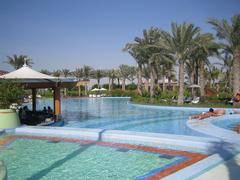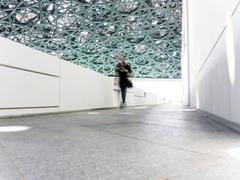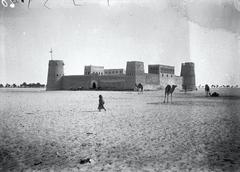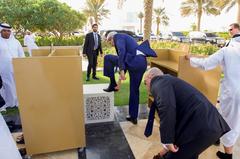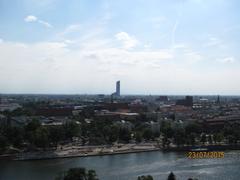Tameer Commercial Tower Abu Dhabi: Visiting Hours, Tickets, and Travel Guide
Date: 14/06/2025
Introduction
Abu Dhabi, the capital of the United Arab Emirates, stands as a testament to visionary urban planning and architectural ambition. Among the city’s most notable—yet unfinished—projects is the Tameer Commercial Tower, once envisioned as a landmark within the rapidly developing Shams Abu Dhabi district on Al Reem Island. This guide provides a comprehensive overview of the tower’s history, architectural significance, current status, practical visitor information, and lessons learned from its development journey. Whether you are an architecture enthusiast, investor, or traveler interested in Abu Dhabi’s urban evolution, this resource offers valuable context and actionable insights (ArchDaily; Skyscraper Center; ID Studio).
Table of Contents
- Historical Context of Tameer Commercial Tower
- Architectural Significance
- Practical Visitor Information and Tips
- Project Challenges and Lessons
- Frequently Asked Questions (FAQ)
- Visuals and Media
- Conclusion and Final Travel Tips
- References and Useful Links
Historical Context of Tameer Commercial Tower
Urban Transformation in Abu Dhabi
Abu Dhabi’s metamorphosis from a modest settlement to a modern metropolis was spurred by the discovery of oil and the implementation of the 1967 master plan by Katsuhiko Takahashi. This plan emphasized high-rise, mixed-use developments to accommodate a booming population and diversify the economy (ArchDaily). Al Reem Island, particularly the Shams Abu Dhabi district, was envisioned as a flagship for this transformation, with Tameer Commercial Tower as its centerpiece.
Development Timeline and Project Status
Initiated in the mid-2000s by Tameer Holding Investment, the Tameer Towers complex included a 74-story commercial office tower intended to stand approximately 300 meters tall, alongside residential towers, retail spaces, and a five-star hotel (ID Studio; Diar Consult; Skyscraper Center). Construction began in 2009, but was halted in 2011 due to financial and legal difficulties. The project was officially canceled in 2017, leaving the site incomplete and inaccessible (The National News; Wikipedia).
Architectural Significance
Design Philosophy and Innovation
The Tameer Commercial Tower was designed by Gensler UK in a modernist style, with sleek glass façades and an emphasis on integrating office, retail, and residential functions. The project featured innovative infrastructure, such as a 14-level parking podium with express ramps for direct apartment access and advanced 3D modeling for complex structural planning (ID Studio).
Structural and Engineering Highlights
- Scale: Planned to accommodate over 6,500 parking spaces over 14 levels, including four subterranean floors.
- Mixed-Use Functionality: The tower offered open-plan office spaces with panoramic city and waterfront views.
- Sustainability: The design incorporated sustainable urban drainage systems and flood risk assessment, reflecting Abu Dhabi’s Estidama program (ID Studio; Metropolis: Estidama Program).
Place in Abu Dhabi’s Architectural Landscape
While never completed, Tameer Commercial Tower was intended to join Abu Dhabi’s roster of iconic buildings, such as the Louvre Abu Dhabi, Central Market, and Al Dar Headquarters (ArchDaily). The project’s ambition mirrored the emirate’s drive for global recognition through cutting-edge urban design.
Practical Visitor Information and Tips
Location, Accessibility, and Visiting Hours
- Address: Shams Abu Dhabi, Al Reem Island, Abu Dhabi, UAE (CTBUH)
- Access: Connected to the city center via bridges, reachable by taxi, private car, or public transportation. The Abu Dhabi public bus system uses the Hafilat Smart Card (Lonely Planet).
- Visiting Hours: The tower is not open to the public due to its incomplete status. Exterior viewing from public roads is possible during daylight hours (8:00 AM–6:00 PM). No tickets or guided tours are available.
Nearby Attractions and Points of Interest
- Al Dar Headquarters: Iconic circular office building.
- Rosewood Abu Dhabi: Luxury hotel with dining and shopping.
- Al Maryah Island: Cultural venues, shopping, and entertainment.
- Reem Central Park: Green space with walking trails and playgrounds.
- Boutik Mall: Shopping and dining.
- Cultural Landmarks (short drive): Louvre Abu Dhabi, Qasr Al Hosn, Sheikh Zayed Grand Mosque (Voyage Tips).
Visitor Tips
- Photography: The unfinished tower provides a stark, photogenic subject. Use public spaces only and respect all safety signage.
- Dress Code: Modest clothing is recommended; cover shoulders and knees in public.
- Transport: Taxis and ride-hailing apps (Careem, Uber) are convenient for reaching Al Reem Island.
- Safety: Abu Dhabi is very safe, but follow local laws and avoid trespassing on construction sites (Lonely Planet).
Essential Travel Information
- Currency: UAE Dirham (AED); cards widely accepted, cash useful for small purchases.
- Language: Arabic (official); English is widely spoken.
- Accommodation: Options on Al Reem Island and throughout central Abu Dhabi; book ahead during peak months (Voyage Tips).
- Best Time to Visit: October–April for pleasant weather.
Project Challenges and Lessons
Delays, Legal Controversies, and Social Impact
Tameer Commercial Tower’s collapse stemmed from the global financial crisis, developer funding issues, and market oversupply. Prolonged delays led to legal battles, with many investors seeking compensation for undelivered units. While some legal recourse was secured, many buyers faced uncertainty and financial loss (The National News).
Urban Planning and Sustainability Lessons
Key lessons from the Tameer Towers saga include:
- Phased Development: Aligning project scale with market demand prevents oversupply and stalled sites (Plan Abu Dhabi 2030).
- Regulatory Oversight: Escrow accounts, insurance, and transparent reporting protect investors and ensure accountability.
- Adaptive Reuse: Repurposing unfinished buildings or sites can mitigate urban blight and contribute to sustainable growth (Metropolis: Estidama Program).
Comparative Case Studies and Policy Recommendations
Global parallels include Spain’s “ghost airports” and China’s “ghost cities,” underscoring the need for:
- Demand-driven project planning.
- Robust stakeholder engagement.
- Transparent, consistent communication and reporting.
Policy recommendations for Abu Dhabi and similar markets:
- Enforce project insurance and escrow requirements.
- Implement early warning systems for at-risk developments.
- Allow for flexible land use and adaptive reuse of incomplete sites.
Frequently Asked Questions (FAQ)
Q1: Can I visit or tour Tameer Commercial Tower?
A1: No. The tower is unfinished and closed to the public. Only exterior viewing from public spaces is possible (CTBUH).
Q2: Are there any tickets or events at Tameer Tower?
A2: No tickets or public events are available due to the tower’s incomplete status.
Q3: What are the best nearby attractions?
A3: Explore Al Dar Headquarters, Rosewood Abu Dhabi, Al Maryah Island, and Reem Central Park for architecture, shopping, and leisure.
Q4: How did the project affect investors?
A4: Many investors faced financial losses and ongoing legal disputes, highlighting the importance of regulatory protection (The National News).
Q5: How can I stay updated on Abu Dhabi architecture?
A5: Download the Audiala app, follow local tourism websites, and explore architecture-focused publications.
Visuals and Media
 Architectural rendering of Tameer Commercial Tower.
Architectural rendering of Tameer Commercial Tower.
 View of Shams Abu Dhabi district and Reem Island.
View of Shams Abu Dhabi district and Reem Island.
Conclusion and Final Travel Tips
The Tameer Commercial Tower’s story encapsulates both the aspirational drive and the risks inherent in rapid urban expansion. Though the tower remains unfinished and inaccessible, its legacy offers valuable lessons in urban planning, market risk, and the need for regulatory vigilance. Visitors to Al Reem Island can still experience Abu Dhabi’s vibrant, modern cityscape through completed attractions and public spaces.
For the latest updates and travel recommendations in Abu Dhabi, download the Audiala app, consult local tourism platforms, and explore related guides to make the most of your visit.
References and Useful Links
- Abu Dhabi Architecture City Guide: 50 Years of City Making, ArchDaily
- Tameer Towers Abu Dhabi Project Details, ID Studio
- Tameer Commercial Tower, Skyscraper Center
- Investors in Stalled Abu Dhabi Project Refuse Half of Money Back Offer, The National News
- Tameer Towers Project, Diar Consult
- Tameer Tower A Details, CTBUH
- Things to Know Before Traveling to Abu Dhabi, Lonely Planet
- Investor Wins Compensation from Developer Over Stalled Abu Dhabi Project, The National News
- Abu Dhabi Vision 2030 Plan, UAE University Faculty
- Estidama Program: Increasing Sustainability in Abu Dhabi, Metropolis
- Things to Know About Abu Dhabi, Go Backpacking
- Things to Do in Abu Dhabi, Voyage Tips
- Tameer Commercial Tower Wikipedia


